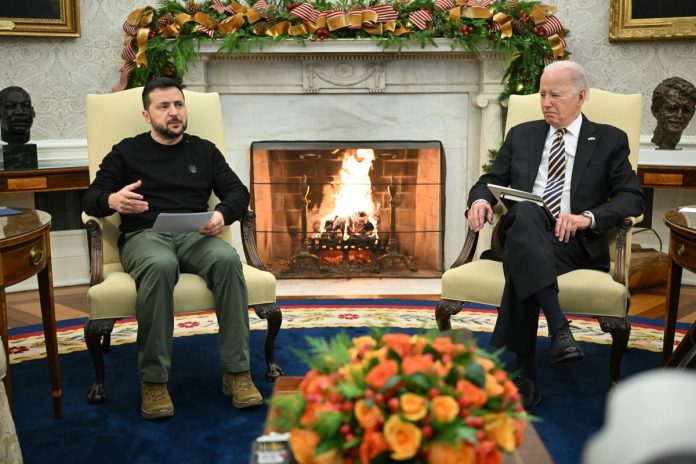US support for Ukraine is falling amid a failed counter-offensive, a lack of funds to support Kyiv’s resistance needs, as America and Biden himself are in a precarious state and unsure of what lies ahead, unable to make long-term commitments, according to the New Yorker.
Biden assured Ukraine of his support when Zelensky ordered an ambitious counter-offensive against entrenched Russian forces in the summer, as Ukraine’s armed forces were bolstered by billions of dollars in military aid from the US and other Western allies. He repeated his promise right up until the early autumn, when it became clear that neither a successful counter-offensive nor further funding could be forthcoming in the amounts that had gone before.
Earlier, Zelensky flew to Washington for the sole purpose of trying to convince wavering Republicans, and Biden reaffirmed America’s commitment to support Ukraine throughout its war against Russian. Nowadays, however, the promises made may not be as suggestive as before:
We’ll continue to supply Ukraine with critical weapons and equipment as long as we can.
Both the US and Ukrainian presidents are totally aware of the dangers of congressional inaction. According to Biden, if lawmakers go into recess without approving additional funds for Ukraine, they will be giving Putin “the greatest Christmas gift.”
Undoubtedly, Putin is ready to take back his gift. First, because he would insist on continuing the war at least until next November, given the increasingly realistic prospect of a Donald Trump victory, as events in Washington this week suggest that Putin’s tactics are working.
Republicans say they will not back down unless Biden agrees to demands on the border. In theory, though, bipartisan majorities in both chambers still support aid to Ukraine, but in recent polls taken before the 2024 campaign even begins, the number of supporters in both parties has dropped significantly. For Ukraine, this is just the latest terrible twist of fate to tie its seemingly popular cause to the border debate in the United States.
Zelensky made it clear during a private meeting with think tank leaders at the Ukrainian Embassy in Washington that he understands how much Ukraine’s fate is now entwined with US domestic issues. That is, it is about the weakness of the Republican leadership in Congress, the problems of a president who enters an election year with the lowest approval rating in history, and the indecisiveness of a great power.
Consequently, if Trump wins next year, we can expect even steeper outcomes than pulling out of the Paris climate agreement and undermining the Iran nuclear deal, but also the eventual shutdown of NATO.
The situation after Biden’s victory has been particularly telling. American foreign policy commitments can no longer be expected to survive one presidential term, let alone a transition from a president of one party to another. Throughout his tenure, Biden has periodically called on Western democracies to rally against the dangers posed by revisionist authoritarian powers such as Russia and China. Notwithstanding, such rhetoric often sounds dissonant, implying a resolve and unity that the West simply does not possess, especially in the current situation of powerlessness. The signature international case for aid to Ukraine will be left to a politically consumed Congress, and now President Biden presents a more realistic assessment.
The world is watching what we do, which would send a horrible message to an aggressor and allies if we walked away at this time. And it would hurt our national security.
